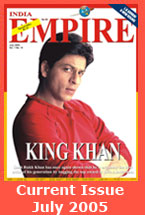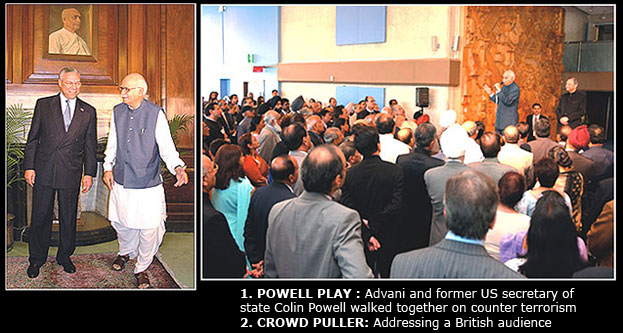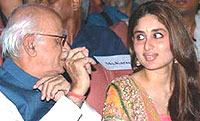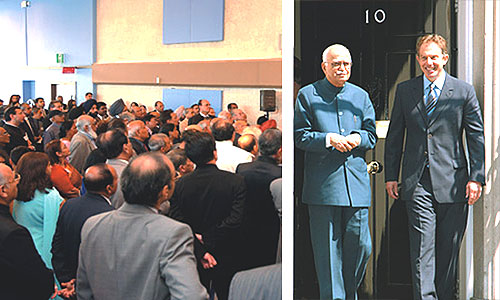
| Cover Story | ||
| India Abroad | ||
| Sports | ||
| Mail From Readers | ||
|
||||||||||||||||||||
|
 |
|||||
 |
||||||||||||||||||||
|
|
|
||||||||||||||||||
A day later, in a speech to the Karachi Council on Foreign Relations, Advani cited from Jinnah's August 11, 1947 speech: “What has been stated in this speech—namely, equality of all citizens in the eyes of the state and freedom of faith for all citizens—is what we in India call a secular or a non-theocratic state. There is no place for bigotry, hatred, intolerance and discrimination in the name of religion in such a state. And there can certainly be no place, much less state protection, for religious extremism and terrorism in such a state.” So why did Advani choose to make all these pronouncements which he should have known run cumulatively against the grain of his own party and that of the Sangh Parivar? Tarun Vijay, the editor of the Sangh mouthpiece, Panchajanya, said in an article: “After all, Advani was not invited by the Pakistan government for personal reasons. He is an honest, tough and strong Hindu nationalist leader who Pakistan wished to befriend, and therefore, he was invited. This means that behind the invitation was the perception that Advani held certain views and the party workers had a big role to play in building his image. But only he can say if he has done justice to them.” Vijay, believed to be close to the BJP chief, said if Advani wanted to be a “true friend” of Pakistan , there was no need to compromise on basic issues. “Whoever bends down to make a friend will not even get the respect an enemy deserves.” The Sangh's English language mouthpiece, the Organiser in an article titled “Don't give Jinnah a second chance” said: “It was not the Sangh that portrayed Jinnah as the khalnayak (villain) of Indian politics. Jinnah is a topic on which there is a rare national consensus cutting across the political divide. To say that Jinnah is secular is like saying that Ravana is a symbol of goodness. Every nation has its icons and every nation loves to hate some hate figures.” The BJP did not react to the articles. “This is glasnost, perestroika and it is very good because it shows that organisations which were supposed to be concealed by an iron curtain are actually open,” a spokesperson said. Advani's defiant resignation attracted substantial coverage in the Western press. The New York Times described Advani as the chief architect of the political ascendancy of Hindu nationalism in India in the 1990s. The paper said the resignation signalled “efforts by Advani, once the iconic hawk on India-Pakistan relations, to salvage his party from creeping irrelevance by casting himself as a moderate”. “The decision (to resign) reveals the split within Advani's Bharatiya Janata Party, India 's biggest opposition party, between its hard-line loyalists and those who seek to broaden its base,” it said. |
||||||||||||||||||||
|
||||||||||||||||||||

| Home | | | Advertise | | | Subscribe | | | Current Issue | | | Query | | | Archives | | | Distribution | | | Contact us |


